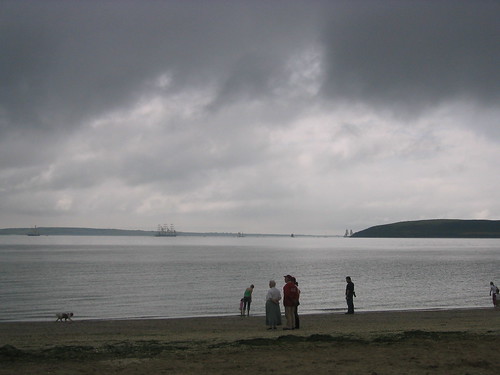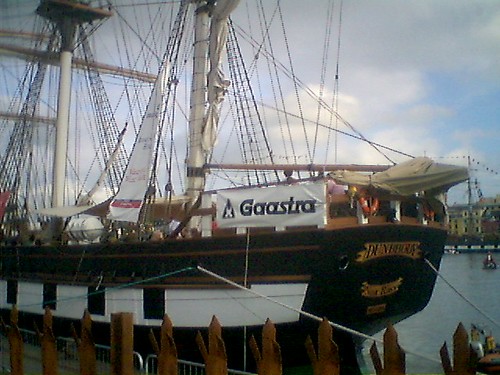26 July 2005
3 Announces Irish Price Plans
At last 3 have announced their price plans for Ireland: ElectricNews.net:News:Three rattles Ireland's 'stale' market
You can order handsets on-line at their Irish home page: 3 Ireland.
25 July 2005
Bloglines Statistics
Ask Jeeves Blog: Which Feeds Matter?
lists statistics on how many RSS subscribers there are to blogs syndicated on Bloglines (owned by Ask Jeeves).
12 July 2005
EURO mGov 2005
I am in Brighton (UK) at a conference about mobile government EURO mGov 2005. The paper I'm presenting is on the underlying infrastructure for mobile services including the move towards IPv6 and the advantages of Open Access Networks (OANs) for public networks (such as those funded by national, regional and local governments). Colleagues from the TSSG in WIT, Jimmy McGibney, Alan Davy and Steven Davy are presenting on how some specific projects in the TSSG can help in the development of next generation mobile government services, in particular with respects to security and service composition (M-Zones, DAIDALOS and SEINIT). In addition Yorck Rabenstain (PSI AG, Germany) is presenting on a project that the TSSG are partners in called RISER that looks at authentication and identity management mechanisms for citizens for eGovernment services.
One common message from the conference is that there are distinct subsections of mGovernment:
- mG2C mGovernment for citizens/customers (access direcly to services a.k.a. eGovernment);
- mG2B mGovernment for business/customers (automating the interaction with business customers);
- mG2G mGovernment for inernal interaction with other public sector entities, inter-departmental, national-regional-local interactions and so on;
- mG2E mGovernment for the employee, in this sense mobility as an aspect of enterprise computing.
Some key enabling factors here are the lowering costs of the hardware for mobile devices, the prevalance of these devices (people have mobile phones and PDAs/laptops with wireless access), the lowering costs of network connectivity and increasing coverage of mobile operators and locally deployed networks (remembering that useful things can be done even without always-on access, just with docking/syncing when in range), and the interoperability of Internet-based technologies that makes it cheaper to develop and deploy distributed services that allow access to services using these devices.
The main bottlenecks are the power consumption of the mobile devices (battery life and recharging is problematic especially of more sophisticated devices), coverage and cost of the various mobile technologies (it costs money to deploy and manage your own network, and/or to use an existing operator's network, and although things are improving, many areas have difficulties getting suitably priced access). The concensus seems to be that the primarily barrier to deployment of new mobile services for government is continuing the high cost of creating integration with enterprise back-office software systems. In effect, many of these systems are propiatory and require a lot of effort to customise for mobile access. The promise is that the next generation of web technologies (Service Oriented Architecures and so on) can help reduce the cost of developing interoperable solutions in this space, just as in all areas of ICT, but few examples of real deployed systems used these advanced technologies.
My personal perspective is that, at the end of the day, all mobile services are simply ICT systems that send data over wireless networks between one location (often centralised) and another. The huge productivity gains that have been possible using Internet-technologies for development of these services (i.e. using IP at the network layer, and web-based protocols at the application layer) are equally valid in the mobile domain as in the desktop with fixed Internet. Problems with the proliferation of the number of devices mean that IPv6 is the obvious choice for such services, thus avoiding NAT-translation issues arising from IPv4 private address space being used to address these devices.
One main difference between mobile Internet (i.e. IP-based) services and fixed Internet services is that often the end device is not fully able to deploy a standard web browser. Some argue that this will end soon, and everyone who needs one will have a smart phone, PDA or laptop that can support a browser (e.g. I personally have an Opera browser on my Sony-Ericsson P910i). Others argue that simpler interfaces such as limited text-menu browsers, simple SMS messaging or even voice-enabled IVR can continue to provide useful mobile services, and thus create a space for separate style of services.
Another big debate is whether mobile operators should be involved in the loop in terms of developing and providing higher level services (other than just Internet connectivity). Internet purists feel that the operators' job should be to provide reasonably priced IP connectivity for mobile devices, and that the services should be developed in a flexibile way that does not require any individual neotiations with operators. It could be argued that is particularly important in the public sector where it would be ludicrous for a local government to only support access to services from citizens using a subset of the mobile operators! Others argue that the mobile operators have access to additional information (such as the SIM-based authentication of identity, an established billing relationship, and potentially some forms of location-based context) that can be very usefully integrated into mobile services in the mGovernment domain, and it would be foolish to ignore the opportunities provided by close collabortaion with operators.
9 July 2005
Tall Ships: Parade of Sail

Early this morning between 7am and 8am the Tall Ships left Waterford and set sail down the river Suir towards the estuary. They headed out past Cheekpoint, Crook, Passage East, Ballyhack and assembled at Dunmore East between 10am and 1pm before going off to race to Cherburg in France this afternoon from offshore of Hook Head at 2pm.
Note that the expression "by Hook or by Crook" comes from Cromwell's statement about how to take Waterford city, by Hook Head or Crook Head (the former being on the County Wexford side of the estuary and the latter on the County Waterford side) c.f. origin of "by hook or by crook".
The whole Tall Ships event has been very successful by all informal feedback and media-filtered feedback I have heard. It was enjoyable for the locals, for the visitors who came to see the Tall Ships and for the crews and helpers on board the various vessels. I think it's given the people of the South East a feel for what can be gained by organising a big event like this, and I hope to see more of the same in the future.
8 July 2005
6 July 2005
Tall Ships in Waterford

The Tall Ships race is starting in Waterford this year and the place is buzzing with visitors... For a taster try out these webcam feeds of the quays: webcam1 webcam2.
For info on the race: Tall Ships.
